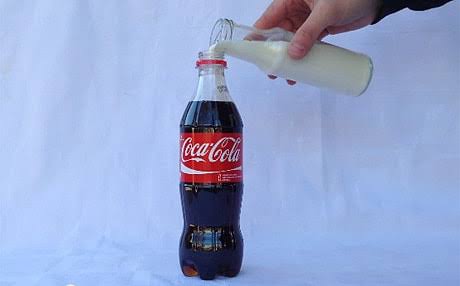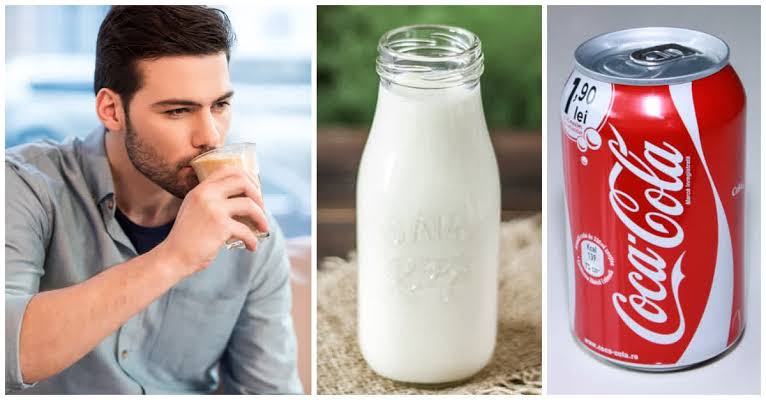Milk and Coke, also known as “Milk Coke” or “Coca-Cola milk,” is a drink combination that has gained popularity in recent years, especially in certain regions or online communities.
The concept involves mixing Coca-Cola, a carbonated soft drink, with milk, a dairy product, resulting in a frothy and creamy beverage.
While some people claim that Milk Coke is a unique taste sensation, others raise concerns about its potential health hazards.
The controversy surrounding Milk Coke stems from several factors. Firstly, it deviates from the traditional use of Coca-Cola as a standalone soft drink, and mixing it with milk may not be appealing to everyone’s taste buds.
The combination of the sweet and fizzy Coca-Cola with the creamy and often fatty milk can create a unique flavor profile that some people enjoy, while others find it unpalatable or even repulsive.
Secondly, there are health concerns associated with Milk Coke. Coca-Cola is a highly sugary and calorie-rich beverage, and milk, while a good source of essential nutrients like calcium and protein, can also be high in saturated fats and cholesterol.
Mixing these two ingredients can result in a drink that is high in calories, sugar, and unhealthy fats, which may not be suitable for those watching their sugar or calorie intake, or those with dietary restrictions such as lactose intolerance or allergies.
Proponents of Milk Coke argue that it is simply a matter of personal taste preference, and that mixing milk with Coca-Cola can create a unique and enjoyable flavor experience.
Some even claim that Milk Coke can have a nostalgic appeal, reminiscent of classic soda fountain drinks or childhood experiments with different flavor combinations.
On the other hand, opponents of Milk Coke express concerns about its potential negative health effects. They argue that the high sugar, calorie, and fat content of the drink can contribute to weight gain, diabetes, tooth decay, and other health issues associated with excessive sugar and fat consumption.
They also highlight that milk and Coca-Cola are two distinct beverages with different nutritional profiles, and combining them may not be the healthiest choice.
The Milk and Coke Phenomenon

This unusual concoction has caught the attention of many, with people sharing their experiences and opinions about it online.
History and Origins of the Milk and Coke Trend
The history and origins of the Milk and Coke trend are not entirely clear, as there are various theories and speculations about how it started.
Some believe that it originated as a dare or challenge among friends, while others attribute it to a creative culinary experiment or a cultural fusion of different beverage preferences.
Read Also: Managing Business Growth Strategies
One popular theory suggests that the Milk and Coke trend has its roots in the 1950s, when milkshakes made with Coke syrup were a common treat in soda fountains.
Over time, the idea of combining milk and Coke as a single beverage may have evolved into a novelty trend among adventurous drink enthusiasts.
Popularity on Social Media and Viral Challenges
In recent years, the Milk and Coke Phenomenon has gained significant traction on social media platforms, where users share their experiences and opinions about this unconventional drink.
Many posts and videos featuring the Milk and Coke trend have gone viral, sparking curiosity and interest among users worldwide.
Additionally, the Milk and Coke trend has also led to the emergence of viral challenges, where people attempt to drink a glass of milk and Coke mixture in one go, often capturing their reactions on camera.
These challenges have gained popularity on platforms like TikTok and YouTube, with participants often expressing a mix of surprise, curiosity, and amusement while trying out this unique concoction.
Different Variations and Recipes of Milk and Coke
As the Milk and Coke trend has gained traction, different variations and recipes of this surprising combination have emerged.
Some enthusiasts prefer to use regular cow’s milk, while others opt for alternative milk options such as almond milk, soy milk, or oat milk.
The choice of Coke can also vary, with some using classic Coca-Cola, while others experimenting with different flavors such as Cherry Coke or Vanilla Coke.
The ratios of milk to Coke can also differ, with some recipes calling for equal parts of milk and Coke, while others suggest varying proportions to suit personal taste preferences.
Some variations also include additional ingredients, such as ice cream, whipped cream, or flavored syrups, to enhance the taste and texture of the drink.
Is It Tasty or Just a Fad?
Opinions about the taste of the Milk and Coke combination vary greatly. Some people find the mixture surprisingly delicious, with the creaminess of the milk complementing the sweetness and carbonation of the Coke, creating a unique flavor profile.
Others, however, may find the combination unappealing, as the taste can be unusual and may not suit everyone’s palate.
While the Milk and Coke Phenomenon has gained popularity as a novelty trend, it remains a matter of personal taste whether one finds it enjoyable or not.
Some may see it as a fun and creative experiment, while others may dismiss it as just a passing fad.
Taste Sensation or Taste Abomination?

The Milk and Coke phenomenon has intrigued many, raising questions about the taste profile of this unconventional combination.
Is it a taste sensation or a taste abomination? Let’s delve deeper into the taste experience of milk and Coke mixture, examining opinions and reviews from those who have tried it, as well as the factors that influence the taste perception, including personal preferences.
The taste profile of milk and Coke mixture is complex and subjective. When combined, the creaminess of the milk blends with the sweetness and carbonation of the Coke, resulting in a unique flavor that can be both surprising and polarizing.
Some people describe it as a creamy, fizzy, and slightly sweet concoction, with the milk adding a smooth and velvety texture to the carbonated Coke.
Opinions and Reviews from Those Who Have Tried It
Opinions and reviews about the taste of milk and Coke mixture vary greatly among those who have tried it.
Some people find it surprisingly delicious, with the combination of milk and Coke creating a balanced and enjoyable flavor profile.
They may appreciate the creamy texture and the contrast between the sweetness of the Coke and the richness of the milk.
On the other hand, some individuals may not find the taste of milk and Coke mixture appealing.
They may describe it as an acquired taste or even as a taste abomination, with the flavors of milk and Coke clashing and creating an unpleasant experience for their palate.
Factors such as personal preferences, taste sensitivity, and cultural background can greatly influence one’s perception of the taste of this unique mixture.
Factors Influencing the Taste Experience
Several factors can influence the taste experience of milk and Coke mixture. Personal preferences play a significant role, as taste is subjective and can vary greatly from person to person.
Some individuals may have a preference for creamy and sweet flavors, and therefore may enjoy the combination of milk and Coke.
Others may prefer more traditional or familiar tastes and may not find the mixture appealing.
Read Also: Why McDonald’s Milkshake Is Good For Your Health
Individual taste sensitivity can also impact the perception of the taste of milk and Coke mixture. Some people may be more sensitive to certain flavors or textures, which can affect their experience of this unconventional combination.
Additionally, cultural background and culinary traditions can shape one’s perception of taste. In some cultures, combining milk and Coke may be considered unusual or even frowned upon, while in others, it may be seen as a creative culinary experiment.
Experimenting with Variations and Recipes
As taste preferences are subjective, some individuals may choose to experiment with different variations and recipes of milk and Coke mixture to suit their own palate.
For example, varying the ratio of milk to Coke can significantly alter the taste profile. Using different types of milk, such as almond milk, soy milk, or oat milk, can also result in distinct flavors and textures.
Furthermore, adding additional ingredients such as ice cream, whipped cream, or flavored syrups can further enhance the taste of the mixture, making it sweeter, creamier, or more indulgent.
These variations and recipes can allow individuals to customize the taste of the milk and Coke mixture to their liking and create a flavor profile that suits their personal preferences.
Health Implications of Milk and Coke
As with any food or beverage, it’s important to consider the potential health implications of consuming milk and Coke mixture.
While it may be a unique and intriguing taste combination, it’s essential to be aware of the following health considerations:
Sugar and calorie content
Both milk and Coke contain significant amounts of sugar and calories. Coke is a carbonated beverage that is high in added sugars, which can contribute to weight gain, tooth decay, and other health issues when consumed in excess.
Additionally, milk naturally contains lactose, a type of sugar. Combining milk and Coke can result in a beverage with a high sugar and calorie content, which can impact overall calorie intake and potentially lead to negative health effects if consumed excessively.
Nutrient balance
Milk is known for its nutritional benefits, being a good source of calcium, protein, and other essential nutrients. However, mixing milk with Coke may disrupt the nutrient balance, as Coke does not provide significant nutritional value.
Overconsumption of milk and Coke mixture without considering the overall nutrient balance of one’s diet may lead to an imbalance of nutrients and potentially impact overall nutrition.
Lactose intolerance
Some individuals may be lactose intolerant, which means their body has difficulty digesting lactose, the sugar found in milk.
Consuming milk and Coke mixture may result in discomfort, bloating, and other digestive issues for those who are lactose intolerant.
It’s important to be aware of one’s own tolerance to lactose and consider alternatives, such as lactose-free milk or non-dairy milk, if lactose intolerance is a concern.
Personal dietary restrictions
Some individuals may have personal dietary restrictions, such as avoiding dairy or sugary beverages due to health conditions, allergies, or lifestyle choices.
Mixing milk and Coke may not align with these restrictions and could impact one’s overall dietary goals or health considerations.
Portion control
As with any food or beverage, portion control is crucial. Overconsumption of milk and Coke mixture without considering portion sizes and overall dietary intake may lead to excessive sugar, calorie, and nutrient intake, which can impact overall health and wellness.
It’s important to remember that moderation and balance are key when it comes to incorporating milk and Coke mixture into your diet.
It’s always best to consult with a healthcare professional or registered dietitian for personalized nutrition advice based on your individual health needs and dietary goals.
In conclusion, the trend of mixing milk and Coke, known as Milk Coke, has gained popularity in recent years, with some people claiming it to be a taste sensation.
However, there are controversies surrounding this drink combination, with concerns raised about its potential health hazards due to the high sugar, calorie, and fat content.
Whether Milk Coke is a unique taste experience or a health hazard ultimately depends on individual preferences and dietary considerations.
As with any food or beverage, moderation and mindful consumption are key to maintaining a balanced and healthy diet.
Read Also: Top 3 Antioxidant Drinks for a Healthier You
